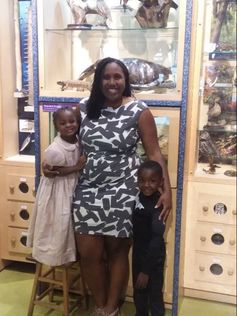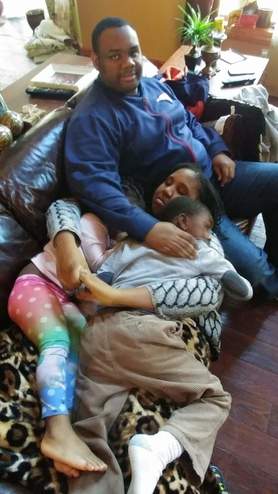By: Waetie Sanaa Cooper Burnette At the Boston Children's Museum. At the Boston Children's Museum. So, it’s November, but I refuse to believe that, just because October has passed, I have missed a chance to highlight Domestic Violence Awareness or a few of my kids' many awesome Halloween costumes. Because, as it turns out, there is a strong, often unnoticed, connection between these two celebrations. Let me explain. In all of my early childhood graduate studies at Lesley University, I am coming to see more and more deeply how important play and experimentation is to every child and adult’s sense of self and feelings of safety. When we are playing, we are most ourselves, and most lost in the moment, something that can be hard or almost impossible to do if we don’t feel a certain amount of safety. Halloween, by its nature, while it can have a scary focus for those who are older, has a different focus for most of the little guys. For those who don’t seek out fear, or the many children with special needs who have limited tolerance for spooky events, Halloween is often about reinvention and stepping out of the role of young and powerless child and into the role of super hero, or some other fantastic person from history or our cultural imagination. And, truly, all survivors of domestic violence in its many forms, and there are many of us, know what it means to be afraid and/or unable to fully show up and offer the very best of ourselves because of the present or past demons that haunt us. There comes a time when it takes courage to even pretend to fully show up when we know we would rather just stay home under the covers or scrolling on our phones! Because even when the sources of our painful experiences are no longer present, we need to begin the scary but important journey of figuring out who we are, separate from simply being a survivor. It takes the shedding of old skin, which may often feel like putting on a costume, as we try out new ways of being. Knowing how important lots of uninhibited time to play and experiment is for all of us, I have loved having the opportunity to see my children’s personalities grow and develop from the highly dependent babies that they once were and transition into more interdependent young people with their own unique and fascinating interests. Whether it’s Halloween or not, when my kids ask to play dress up, my answer is usually a resounding, “Yes!” Because I know intrinsically that, no matter how young or small they may be, experimenting with being powerful, capable, and invisible is great practice at any age.  Toddler girl breastfeeding while her mom and her brother nap on uncle's lap. Toddler girl breastfeeding while her mom and her brother nap on uncle's lap. In fact, today, when we got ready for our trip to the Boston Children’s Museum, my son wanted to go in his Batman costume, and this decision inspired my daughter to go in her Princess dress. These were easy requests to make happen, and they loved all the attention they received throughout the day on the train and bus rides into the heart of the city. Over the course of our time at the museum, I watched as they played, dreamed, explored, and climbed on the various exhibits, and thought about all of the ways I have tried to create an environment in which they feel completely safe and free to be whoever their hearts’ desire. I feel blessed to have had the opportunity to be at home with them for a significant portion of each of their lives, and that I have been able to advocate for and persist in my expectation that they deserve high quality educational opportunities and/or care when I am at work. Watching them soak up the many benefits of all that we have already done and seen in their early years has been more powerful than I could have imagined. As African-Americans, it is also far from lost on me that, in the context of our country’s history of enslavement, that only a few generations ago, the many small, simple pleasures and protections that my children enjoy—freedom to explore, to pursue their interests, and to take for granted that they will remain connected to a large extended community of family and friends-- were impossible for so many of our people to attain. So, as I think about how we increase maternal wellness, breastfeeding rates, and reproductive justice for our segment of the population, I am also required to factor in that legacy of oppression along with the many studies that report on the major and persistent health inequities between women of color and white women. For example, “African-American women and Latinas [still] experience higher rates of intimate partner violence and abuse, up to 35 percent more than white women, making the intimacy of breastfeeding and nurturing an infant much more difficult.” (You can read more about why these two issues of violence and breastfeeding are intrinsically connected here at Rewire News). And, over a long and repeated period of time, all types of violence will eventually get in the way of our capacity to stay light-hearted and maintain the kind of playful and loving environment in which we all thrive. The idea that how we parent, how we relate to one another as adults, and the environment we create in our families, schools, and communities will impact the kind of adults, community members, and leaders our society produces is not a new one, but it still seems that many in our society do not see that babies and young children who see peace of mind and the assumption of safety as a birthright will be adults who extend those peaceful structures in a variety of ways. Recognizing the importance of all of these various experiences and settings helps me remember that the spontaneity, joy, levity, peace, and freedom to create and re-invent, all which I seek for myself and my children, cannot be fostered in an environment in which family or community members feel perpetually unsafe. Even when home isn’t safe, there are many who find safe havens in places like our YMCA’s, boys’ and girls’ clubs, churches, mosques, synagogues, schools, and other community gathering places that provide the supportive space to explore and just be. For our youngest community members, we need to create and support more and more places where they can reliably go and know that they will be safe from violence and chaos of all kinds, including corporal punishment or other oppressive strategies of gaining compliance from our children. I say this fully cognizant of the fact that while African- Americans have a variety of view-points on various parenting practices, corporal punishment continues to be a common and widely accepted approach across many different segments of our communities. While younger generations seem more open to other practices, many hold onto this tradition due to the belief that if we spare the rod, we will spoil our children. Our desire to ensure that our children are highly disciplined as they navigate the challenges of being people of color outside of our homes can then lead us to be overly rigid in our expectations, regardless of our children's developmental stages and needs. This is in spite of the fact that there is significant research, like from the American Psychological Association and this fascinating discussion in Slate magazine, that explores why corporal punishment simply does not work in the long term. But, despite all of this data, cultural practices still die hard, and going against the grain does take courage. And yet I persist in thinking that greater awareness and understanding of the many things we can do to assist families to thrive and don’t cost a dime are important to reiterate. Because I find an amazing parallel between the many barriers which make it difficult for us to commit to breastfeeding and family dinners (two protective practices which evidence routinely finds to be a bonus for babies and families) and those that prevent us from finding the time and patience to research and implement discipline measures that are not physical. In both cases, our adherence to intergenerational traditions and pressure to do things in the way that they have always been done can truly be counterproductive. Confronting and transforming these patterns is delicate and labor-intensive work that does not happen overnight. But, when I look at my Batman and my little princess, I know that I cannot succeed in teaching them that the human body is beloved, precious, and to be treasured while using or affirming that physical discipline is an acceptable way to direct and control their behavior. The Kingdom and Queendom that I imagine for these two is filled with opportunities for communication, support, negotiation, compromise, and, of course, lots of play! So while it is a challenge to build and nurture these spaces, it’s the kind of challenge that seems large enough and worthwhile enough for me and my family to focus upon for many years and generations to come! If you are interested in continuing this conversation, join us at Vital Village’s Network Connection Meeting “Courageous Conversations on Child Discipline”, which will be co-hosted by the Suffolk County Sheriff's Department and Father’s Uplift on February 12, 2018 from 6-8 PM at 72 East Concord Street.
0 Comments
|
AuthorDaily Milk hosts articles, posts and ideas from various members of our breastfeeding coalition! Archives
August 2023
Categories |
 RSS Feed
RSS Feed
